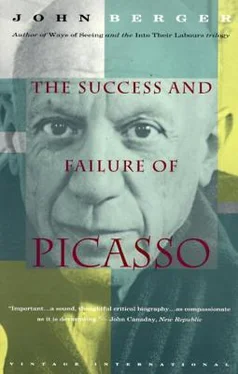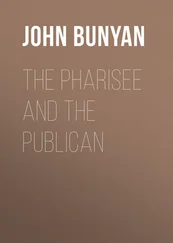You may say this is naïve and only another form of innocence. But here we must make a distinction between innocence as an aim of experience, and innocence as a natural state of being. The former is a social idea which, like the concept of Utopia, is the result of men seeing the possibility of a future which could be better than the corrupt present. Innocence as a natural state of being is by definition changeless. No such thing exists. The theoretical possibility of such a state inspired Rousseau — but part of his greatness was that he never glossed over or hid the contradiction in his theory. In Picasso’s case his belief in a natural state of innocence is a dream in which he only half believes, but which allows him to retreat deeper and deeper back into himself and his strange isolation.
If we compare the relationship of the figures to one another in the two paintings, the two different interpretations of the meaning of innocence are confirmed. Léger’s is essentially a social attitude; Picasso’s essentially a private one. In the Léger, the four figures are so united that it is quite difficult for the eye to separate them. Each is not only aware of the others but is dependent upon them. Although their faces are calm, their hands express the utmost tenderness. In the Picasso, there is no relationship between any of the figures — even the mother, whilst feeding her baby at her breast, is reading. The two women dancing suggest a collision rather than a couple. The only possible connexion one can find anywhere is the boy in the bottom left corner touching the bird-cage, which is attached by a string to the stick of the boy doing a balancing act above. And this is only a trick of drawing and perspective; a purely formal connexion. Otherwise each person, like a sleep-walker, pursues his own dream.
I have tried to show you, on the evidence of paintings from 1900 to 1952, how Picasso’s imagination and intuitions have always presented him with an alternative to modern Europe: the alternative of a simpler, more primitive way of life. The Cubist period from 1907 to 1914 was the great exception to this. Then, the influence of friends and of other artists led him to believe for a short while in the opposite alternative: that of a more complex, more highly organized, more productive way of life. Except for this Cubist period, his genius has always owed allegiance to the comparatively primitive. It is this allegiance which underlay his self-identification with outcasts in the so-called Blue and Pink periods. It is this which inspired the rage of the Demoiselles d’Avignon. It is this which explains the fancy-dress and magic with which he protected himself after the First World War. It is this which was the secret of the physical intensity of his work in the thirties and early forties when he was painting autobiographically. It is this which is now the excuse for the sentimental pantheism of most of his original paintings (original as opposed to his variations on the themes of other artists) since 1944.
Reality, Lenin used to say, is slyer than any theory. What we have so far argued does not begin to explain everything about Picasso. But it can, I think, bring us nearer to understanding what at first seemed to be a mystery. What is the power of Picasso’s personality? What is the experience that lies behind the expression of his eyes which nobody can resist? What is the connexion, if any, between his temperament and his success? We are now at the point where we can at last suggest an answer. Although the answer, as you will see, leads to another and most unlikely question.
• • •
A few pages back I mentioned Jean-Jacques Rousseau. It is he who can give us the terms of reference with which to place and define Picasso’s subjective experience.
It is a commonplace today that one reads history the better to understand the present. And one wants to understand the present so that one can mould the future. In the minds of thinking men the present is always under attack from the past and future simultaneously. Those in revolt are usually inspired by a vision of the future. Occasionally — as with the Jacobites, or the Carlists in Spain — they are inspired by a vision of the past. Yet it is a constant truth that the past, if it could, would always overthrow the present. Every historical phase has the moral equipment with which to condemn the one that follows it. There are two reasons for this. First, because the moral code of a period is specifically designed to maintain the status quo and to prevent a new social class gaining power; secondly, because a development in social organization from the comparatively simple to the comparatively complex is bound to be offensive to any morality, since the function of morality is to simplify.
Rousseau was the first to perceive this contradiction between progress and morality. Why, he asks, did Diogenes have to search everywhere looking for a man? Because Diogenes ‘sought among his contemporaries a man of an earlier period’.
Appalled by his own society, and pushing the logic of the contradiction back and back to its starting-point, Rousseau invented the ‘noble savage’, innocent and happy in a natural state. Perhaps it is wrong to refer to the noble savage as an invention; rather he was an idealization — bearing roughly the same relation to reality as a sculpture by Praxiteles does to the human body. The purpose of the idealization was to condemn — and condemn utterly — the present. At the beginning of the Origin of Inequality , Rousseau wrote:
The times of which I am going to speak are very remote: how much are you changed from what you once were! It is, so to speak, the life of your species which I am going to write, after the qualities which you have received, which your education and habits may have depraved, but cannot have entirely destroyed. There is, I feel, an age at which the individual man would wish to stop: you are about to inquire about the age at which you would have liked your whole species to stand still. Discontented with your present state, for reasons which threaten your unfortunate descendants with still greater discontent, you will perhaps wish it in your power to go back.
There were other thinkers whose influence was more precise than Rousseau’s. He is a key figure because he expressed a general imaginative and moral attitude.
I have seen [he said] men wicked enough to weep for sorrow at the prospect of a plentiful season; and the great and fatal fire of London, which cost so many unhappy persons their lives or their fortunes, made the fortunes of perhaps ten thousand others. Let us reflect what must be the state of things when men are forced to caress and destroy one another at the same time; when they are born enemies by duty, and knaves by interest. It will perhaps be said that society is so formed that every man gains by serving the rest. That would be all very well, if he did not gain still more by injuring them.
‘The state of things when men are forced to caress and destroy one another at the same time’ is one of Kafka’s principal themes. And Kafka is so important and horrific as a writer not because he was neurotic, but because, a hundred and fifty years later, he too was a prophetic witness.
What Rousseau found to condemn in the eighteenth century, thinking sometimes of an early capitalist England and sometimes of an absolutist France, became more and more obvious in the nineteenth and twentieth centuries. He is the first sceptic of the coming age of faith in progress. But this same scepticism could be used, in the name of progress, to criticize society. To society he opposed Nature; to the corrupt, over-civilized, and greedy he opposed ‘the noble savage’.
Not surprisingly, Rousseau’s attitude was put to many different uses. He inspired Jefferson’s American Declaration of Independence. Robespierre looked upon him as a master. The revolutions and struggles for national unity and independence that followed the French example — in Italy, Greece, Poland, Russia — were all ideologically influenced by him. It was he who made Liberty, Equality, Fraternity, the natural rights of the natural man, because man was naturally free and good. In all these cases his attitude was an example for those making or attempting bourgeois revolutions.
Читать дальше












